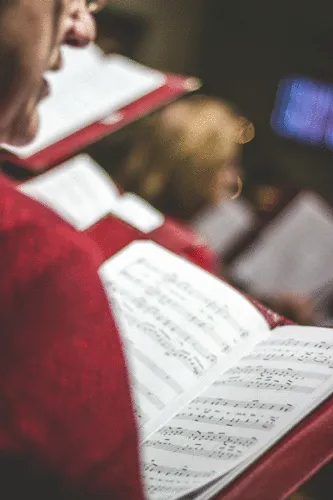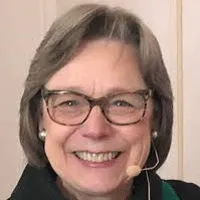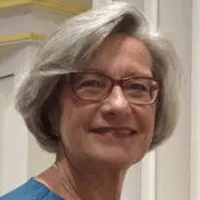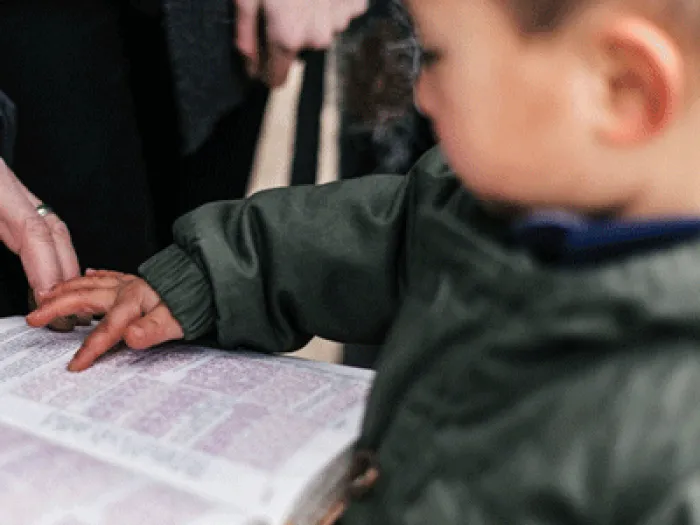PAM Town Hall illustrates the importance of pastors and music leaders working creatively and collegially
One church that does both well is Clarksville Presbyterian Church in Virginia


LOUISVILLE — Can pastors and musicians be friends? Only if the way be clear, in Presbyterian parlance, and a Town Hall put on Thursday by the Presbyterian Association of Musicians demonstrated just how the relationship can flourish when music and worship planning are done intentionally and lovingly.
PAM Board Member Brian Tanaka interviewed the Rev. Annette Goard and Carol Henderson, the pastor and music director, respectively, at Clarksville Presbyterian Church in Clarksville, Virginia. After about five years of working together — Goard is serving in her first call after completing her MDiv at the Duke Divinity School — the two are so close they go shoe shopping together.
Henderson fondly recalls the day she met Goard. “Annette had just started moving in. My husband came over to meet her and welcome her,” she said. “He came home unbelievably excited and said, ‘You’ve got to get over here right now and meet Annette!’” Henderson had been working in the yard, but she went over nonetheless, and she and Goard ended up talking for two hours. “I was working at an Episcopal church in a neighboring community. Clarksville Presbyterian Church had always been our home church. I didn’t know then I’d soon be working there.”
“We needed a music minister,” Goard said. “We had been told, ‘She is better than you deserve. You can’t afford her.’ When Carol raised her hand, we won the lottery.”

Tanaka asked Goard to describe her process for planning worship. Each Sunday after worship, Goard goes home and has the same meal — a turkey sandwich — before returning that afternoon to the now quiet church. She updates the church’s prayer list, sends out the weekly email to members and friends, sits down with the lectionary passages and decides which preaching texts to use for the following Sunday. When the order of worship is done, she emails it to the secretary and to Henderson, “and we take it from there.”
For her part, Henderson uses the lectionary to select hymns and choir anthems several months in advance. “It’s a value to have Annette using the lectionary. I craft music around those themes,” Henderson said. With several possible hymns selected for worship in advance, “that affords me the opportunity to swap out based on what she gives me.”
“Every minister is a little different with how they operate,” Henderson said. “It’s key for the musician to hook into the philosophy the minster has to see if you can mesh your planning with whatever the minister has in mind.”
While generally sticking to the same order of worship, the two sometimes get creative with liturgy.
This week, the church is blessing those going on a trip. Next week, “we’re blessing the new choir robes,” Henderson said. “We don’t do a lot off the cuff.”
“Generally, I’m pretty relaxed during worship,” Goard said. “A piece of that is, I am really comfortable working with Carol.”

“Musically, there are so many things that can go well or go haywire” on any given Sunday, Henderson said. “I have worked at places where I am very guarded in the [worship] space. When you get done, it’s a feeling of exhaustion.” That’s decidedly not the case at Clarksville Presbyterian Church.
“In my mind, the best way to deal with conflict is before the conflict arises,” Goard said. “I respect Carol highly, trust her implicitly, and value her as an extraordinarily talented musician and as a good friend. The key to a successful working relationship is trust and respect. When something comes up, you can have a conversation rather than conflict.”
“There have been times when we have a different idea or opinion. But we always discuss it,” Henderson said.
“This congregation — the more you get to know them, you say, ‘Wow!’” Goard said. “We have so many interesting people with so much to give — why wouldn’t I want to take advantage of that and bring people in?” During the early stages of the pandemic, “there was a lot of information coming in, so I put together a team to help us deal with that. Some people thought decisions were bring made under the cloak of darkness, and so I said, ‘I can learn. We will involve the entire session.’ We switched gears, and people felt like they were being heard.”
“She moderated that session meeting in an artful way I have not seen in a long time,” Henderson said. “She brought out everyone to speak — even those who were sitting there quietly. She made that atmosphere happen.”

“For those who don’t have that much in common, how do you build those qualities?” Tanaka asked. “I know you two go shoe shopping together.”
“If you can’t go shoe shopping with the person you’re working with, you might be able to go to lunch,” Henderson said. “It’s important to get off campus and, at some point, off topic. We don’t talk about church all the time. It takes time getting to know each other on a human level. When you work together, it can help to build that relationship.”
Henderson said that not everyone — pastors included — understands the “invisible time” church music directors put into their work. “It’s hard to quantify,” she said. “What Annette has done for me is allow me to share my talents fully. The worst positions for me have been when I couldn’t do that — when the pastor felt threatened by me.”
Musical ability is “a gift from God,” Henderson said, “and we’re supposed to share our gifts.”
“Carol is a musical genius. Why would I ever do anything to impede that creativity?” Goard said. “Worship needs to be joy-filled, and together we have fun. When Carol is joyfully doing what God gave her to do, everyone is a winner. People burst into applause because it’s glorious. No one applauds my sermons.”
A webinar participant asked about W-2.0304, the portion of the Directory for Worship that states teaching elders are the ones who are responsible for the selection of music to be sung during worship.
“Carol and I talked about this. We read that paragraph yesterday,” Goard said. “At the end of the day, the buck stops with me, but it’s a collaborative thing. If we do something in worship that ticks someone off, it’s my office they will walk into with their hair on fire, and it’s my job to listen to them. At the end of the day, I’m responsible.”
“She is responsible,” Henderson added, “to make sure I’m doing my work.”
“The thing is, [people in church] trust us,” Henderson said. “You have to be willing to make compromises with your creativity.”
Learn more about Town Halls put on by the Presbyterian Association of Musicians here.
You may freely reuse and distribute this article in its entirety for non-commercial purposes in any medium. Please include author attribution, photography credits, and a link to the original article. This work is licensed under a Creative Commons Attribution-NonCommercial-NoDeratives 4.0 International License.

